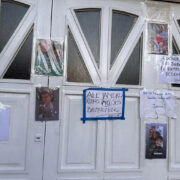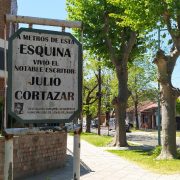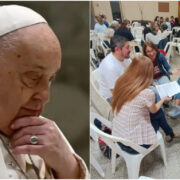According to the last report by the Argentine Journalism Forum (FOPEA) journalists and media suffered “an attack to their freedom of speech every three days”. In 42.4 percent of the cases, the aggression came from State officials.
The report was presented on World Press Freedom Day on May 3rd and was elaborated by the FOPEA fellows, who since 2006 have collaborated in the survey throughout the country.
Fernando Stanich, journalist and member of the Monitoring Commission, said that 2023 “is a peak-year in cases compared to the previous five”, with 117 episodes of “attacks and obstructions to press freedom and freedom of expression”: 30 percent occurred in the Buenos Aires City, 10.3 percent were registered in Buenos Aires province and another 10.3 in Santa Fe. Finally, 7.8 percent of the cases correspond to Tucumán, and Jujuy province closes the list of the five jurisdictions with the most attacks with six percent of the cases.
«The monitoring work shows that the greatest presence of attacks last year has to do with national, provincial and municipal public officials; the State as the aggressor. That is, those who have the greatest responsibility for guaranteeing the right to freedom of expression, they are the ones who beat it the most in Argentina. And there is no partisan distinction”, Stanich said.
Stanich, who is also a professor and editor of La Gaceta from Tucumán, wondered if it is a coincidence that the peak of cases recorded was in an election year “and that it has as its characteristic a strong presence of State violence against journalists”. He also considered that “the situation is serious”, because “it is an x-ray of the intolerance that journalists in Argentina are going through”.
“When a president, a governor or a mayor questions or attacks a journalist, it is not his opinion, but rather he speaks on behalf of the State. It is the position of the State regarding the right to freedom of expression”, Stanich said. Also said that “the State, instead of guaranteeing the free circulation of information, what it does is hinder it”.
The journalist cited an opinion survey by the consulting firm Giacobbe, carried out between April 19 and 23, 2024. The survey shows that 56.2 percent of people think it is “good that President Javier Milei says whatever he wants about journalists”, because “he is free to criticize them”, and 41.3 percent thought that “it is wrong”. Only 2.5 preferred not to answer.
“There is a good part of society that supports journalists being attacked. Of course, we do not have the levels of violence that occur in Latin America and the Caribbean, but there is a particularity that occurs in Argentina that has to do with the constancy, the perseverance of the attacks. They are not injured by force, but by the constancy of the attacks, and that is what is happening, there are the consequences of the injuries”, Stanich said.
He also mentioned “the increase in the presence of organized crime as an aggressor”, on the one hand, and on the other, “the insistence on the use of criminal and civil justice to intimidate journalists”. He also mentioned “the increase in attacks against women journalists”. In 2022, FOPEA monitoring recorded 18 percent of female journalist victims and in 2023 raised up to 23 percent.
“Women journalists are not attacked because of the quality of their work, but because of stereotypes and issues linked to their private lives. Last year, there were two cases of gender editors who had to resign as a result of the harassment they suffered for their work,” he said.
“Dirty clothes are not washed only at home”
FOPEA’s vicepresident, Claudio Jaquelin, the work of monitoring works to “exposing those who attack, exposing the situation in which journalists and the media are victims of powers that aren’t only political, because the network of relationships between licit and illicit, legitimate and illegitimate powers, is increasingly greater”.
“We see these days there are many countries, many organizations, that are increasingly focusing on Argentina, looking with more concern and asking for details of what we are collecting to report on. Argentina is back in the world and not necessarily for good reasons”, said Jaquelin.
On a similar note, the organization Reporters Without Borders placed Argentina in 66th place in its World Press Freedom Index, due to its «high concentration and opacity of media ownership, polarization, the absence of public policies to guarantee plurality, as well as the precariousness of the exercise of journalism”.
Around the world, the organization confirmed that “press freedom is threatened by the same people who should be its guarantors: the political authorities”. It also showed that of the five indicators that make up the countries’ scores, «the political indicator is the one that decreases the most in 2024», with a drop of 7.6 points.
Last year, Argentina was in 40th place in the ranking, but this year fell 26 places, since “Javier Milei’s arrival, whose speech is hostile to the press and marks a new and worrying turning point for the guarantee of the right to information in the country”.
That is why Jaquelin said that “dirty clothes have to be washed outside home, in addition to doing it at home”, and said that it is important to “expose it, show it, not naturalize it”: “Don’t think that if a president shouts or insults for networks is part of their logic of building power, or if a president disqualifies a journalist it is part of the game of politics and power,” he said.
The vicepresident said that “when the highest authority in the country insults, attacks, disqualifies, stigmatizes, denounces a journalist, it generates reactions”, and characterized his attitude as “performative”, because it allows “others to take him to action, they insult, attack, spit on, and hit journalists”.
“We are very concerned about the situation, and it is super important to expose it outside, to accompany us inside, to become aware that these attacks are not attacks against journalism, against the media, against freedom of expression. They are attacks against democracy. A silenced democracy, of citizens who become invisible when they express their opinion against what the authorities think, who ask what the authorities don’t want, is no longer a democracy”, he said.
A complex scenario for journalism
Faced with the phrase “there is an excessive abuse of press freedom” said by expresident Alberto Fernández, and the swearing-in of Milei’s Cabinet ministers behind closed doors on December 10, the president of FOPEA, Paula Moreno Román, reflected about this “context of situation that puts journalism in a complex situation”.
“We have a situation that goes beyond a physical punch, the direct aggression, and that has to do with work contexts that today make journalists also rethink whether it is worth denouncing or exposing themselves to denouncing”, she said.
Román said that the “key” is to revalue journalistic work both from “the figures with space for institutional responsibility” and “inside” among the press workers themselves. If not, we run the risk of “entering a scenario in which far from what the world is discussing today, which is concern about misinformation, we are promoting it”.
“We are clear about what our task is, we generate a code of ethics and those of us who are within FOPEA understand that we must validate it every day. We follow professional standards, we work with verification of facts, with balance, with precision, with the need to get closer to the truth. That’s our job”, she said.
Román said that journalists are “in the eye of the storm” due to the “level of aggression that occurs during the current president’s administration”, and said that “the path is dialogue” although currently there are “a constant screaming situation”.
“Journalists can do their job poorly if they are subjected to presidential anger and, above all, to what this criticism then unleashes in a number of anonymous people, with impunity from the networks, sometimes even mentioning personal issues”, she said.
Finally, he said that it is necessary to create “more alliances” and along those lines he talked about the different projects that FOPEA carries out. For example, “Informar sin dañar(nos)”, a podcast produced with the support of the Embassy of the Kingdom of the Netherlands in Argentina that, through six episodes, tells of 12 cases reported by the monitoring of freedom of expression.
“The media today are seeking their survival. Audiences mutate and believe little. The Government sets up a ring instead of a space for debate. And journalists try to survive in this space by believing in journalism. We believe that quality in professional practice is our main resilience tool, and we have to work together for that”, she said.
AUNO-7-5-24
FM-JR-SAM



















